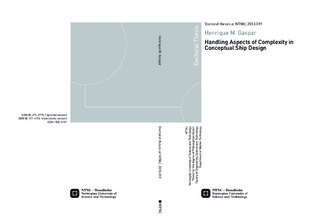| dc.contributor.author | Gaspar, Henrique M. | nb_NO |
| dc.date.accessioned | 2014-12-19T12:10:46Z | |
| dc.date.available | 2014-12-19T12:10:46Z | |
| dc.date.created | 2014-01-20 | nb_NO |
| dc.date.issued | 2013 | nb_NO |
| dc.identifier | 689263 | nb_NO |
| dc.identifier.isbn | 978-82-471-4775-7 (printed version) | nb_NO |
| dc.identifier.isbn | 978-82-471-4776-4 (electronic version) | nb_NO |
| dc.identifier.uri | http://hdl.handle.net/11250/238757 | |
| dc.description.abstract | This research examines the handling complexity aspects of conceptual design. Contemporary consensus suggests vessel design must consider new market requirements such as greater emphasis on environmental performance, a larger degree of uncertainty in terms of contract horizon, and the need for reliability of multiple operations assessed during early stages. Consequently, the industry has experienced development on many levels of ship design, from advanced subsystems (e.g., a wide range of machinery congurations), to vessels with demanding operations (e.g., modern oshore support vessels), to incorporation of eet assessment in early stages. Designers face a number of new technologies - usually representing greater investment - to obtain improved energy eciency and exibility regarding multi-faceted, future scenarios in which the vessel must operate. This large number of options results in an increase in the amount of information that should be considered to understand important aspects of the ship during the conceptual phase. This thesis is based on a systems engineering perspective to approach these kinds of developments, especially recent theories combining complexity theory in engineering.
This thesis reviews current methods and approaches that deal with conceptual ship design and its complexity aspects. Based on this review, three research questions are proposed. First, which general complex systems theory premises can be used to dene complexity in conceptual ship design? Second, what general principles for organizing and simplifying complexity t the conceptual ship design task? Third, what methods eciently handle primary complexity aspects during conceptual ship design?
The results of this study are the identification of the general principle of handling complexity, based on decomposition and encapsulation, as a strategy to manage relevant information during conceptual design, and proposing a five-aspect taxonomy to characterize and classify complexity in conceptual ship design. The taxonomy categorizes five aspects of conceptual ship design. The structural aspect relates to arrangement and interrelationships of the physical parts in the ship. The behavioral aspect derives from form-function mapping. The external circumstances to which the ship is subjected are captured in the contextual aspect. Uncertainties in future scenarios and expected/unexpected changes over time relate to the temporal aspect. The perceptual aspect relates to how various stakeholders perceive the value they receive from a design through the operational life cycle of the vessel.
A discussion of both traditional and novel techniques to handle each of the aspects is presented. Focus is given to methods able to handle the three extended aspects (i.e., contextual, temporal, and perceptual). The goal of the study is to designate ship design as a complex system problem, developing and improving methods capable of handling primary complexity aspects during the conceptual phase.
The primary contribution is characterization of conceptual ship design as a complex systems engineering task. Decomposition and encapsulation is presented as a general principle to handle complexity during the conceptual phase of ship design. More importantly, it identifies the intelligent encapsulation allowed by the five-aspect taxonomy, with implementation and development of methods to handle each aspect. Structural and behavioral aspects are investigated, merging traditional and novel techniques. Epoch-era analysis and a ship design deployment problem are used to tackle contextual and temporal aspects. The perceptual aspect is discussed through complex value robustness, and integration and concurrent assessment of all five aspects is handled theoretically through the responsive systems comparison method.
This thesis consists of two parts. The first contains an introductory chapter presenting the background, the research questions, state-of-the-art conceptual ship design, ship as a complex system, information growth in ship design and complexity in a systems engineering framework, the research approach, a timeline of the research, initial results of a study of complexity aspects, results relevant to answering the three research questions, discussion of contributions, concluding remarks, and future research. The second part contains the five papers, in which individual results and contributions are discussed in more detail. | nb_NO |
| dc.language | eng | nb_NO |
| dc.publisher | Norges teknisk-naturvitenskapelige universitet, Fakultet for ingeniørvitenskap og teknologi, Institutt for marin teknikk | nb_NO |
| dc.relation.ispartofseries | Doktoravhandlinger ved NTNU, 1503-8181; 2013:319 | nb_NO |
| dc.relation.haspart | Gaspar, Henrique Murilo; Erikstad, Stein Ove; Ross, Adam. HANDLING TEMPORAL COMPLEXITY IN THE DESIGN OF NON-TRANSPORT SHIPS USING EPOCH-ERA ANALYSIS. International Journal of Maritime Engineering. (ISSN 1479-8751). 154: A109-A119, 2012. <a href='http://dx.doi.org/10.3940/rina.ijme.2012.a3.230'>10.3940/rina.ijme.2012.a3.230</a>. | nb_NO |
| dc.relation.haspart | Gaspar, Henrique Murilo; Rhodes, Donna; Ross, Adam; Erikstad, Stein Ove. Addressing Complexity Aspects in Conceptual Ship Design - A Systems Engineering Approach. Journal of Ship Production and Design. (ISSN 2158-2866). 28(4): 145-159, 2012. <a href='http://dx.doi.org/10.5957/JSPD.28.4.120015'>10.5957/JSPD.28.4.120015</a>. | nb_NO |
| dc.relation.haspart | Gaspar, Henrique Murilo; Balland, Oceane; Aspen, Dina M.; Ross, Adam; Erikstad, Stein Ove. Assessing air emissions for uncertain lifecycle scenarios via re-sponsive systems comparison method. . | nb_NO |
| dc.relation.haspart | Gaspar, Henrique Murilo; Hagen, Arnulf; Erikstad, Stein Ove. Designing a Ship for Complex Value Robustness. . | nb_NO |
| dc.relation.haspart | Gaspar, Henrique Murilo; Rhodes, Donna; Ross, Adam; Erikstad, Stein Ove. Handling Complexity Aspects in Conceptual Ship Design. Proceedings 11th International Marine Design Conference - IMDC2012: 339-354, 2012. <a href='http://dx.doi.org/10.3940/rina.ijme.2012.a3.230'>10.3940/rina.ijme.2012.a3.230</a>. | nb_NO |
| dc.title | Handling aspects of complexity in conceptual ship design | nb_NO |
| dc.type | Doctoral thesis | nb_NO |
| dc.contributor.department | Norges teknisk-naturvitenskapelige universitet, Fakultet for ingeniørvitenskap og teknologi, Institutt for marin teknikk | nb_NO |
| dc.description.degree | PhD i marin teknikk | nb_NO |
| dc.description.degree | PhD in Marine Technology | en_GB |

